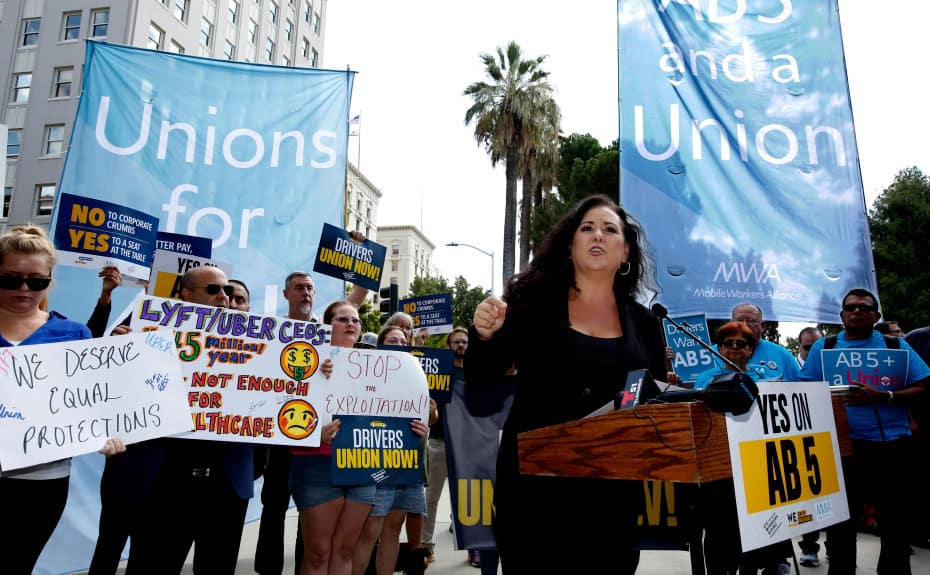
This article was originally published on The Orange County Register.
Across the country, it is taken for granted that just a few taps on a smartphone can get you just about anywhere you want to go. Ride-sharing apps like Uber and Lyft have revolutionized urban transportation and it’s easy to forget that this convenience didn’t exist even just 10 years ago.
Now, California is set to return to those days this Friday—the day that Uber and Lyft say they will be forced to suspend operations in the state due to a new state law. The impending suspension is bad news for both the customers who rely on the service and the 220,000 drivers earning income through the platforms.
As is often the case, this disruption stems from a well-intentioned but poorly thought out law designed to protect workers from exploitation. Last year, California lawmakers passed Assembly Bill 5 (AB5), setting stricter standards for when workers should be classified as employees rather than independent contractors.
Despite being able to decide their own workdays, working hours, start times, and end times, drivers for ride-sharing platforms like Uber and Lyft must now be classified as employees rather than as independent contractors.
While the law affects freelancers in many industries, the reclassification of drivers would lead to significantly higher expenses for Uber and Lyft—essentially prohibiting their business model. The law went into effect in January, and earlier this month a judge issued a ruling forcing Uber and Lyft into compliance.
These developments could hardly come at a worse time for California. Due to the pandemic and the accompanying lockdowns, the state’s unemployment rate sits at nearly 15 percent. Since mid-March, more than six million people (a third of the state’s total workforce) have applied for unemployment benefits. Furthermore, in a recent wave of new applications for unemployment benefits, more than half of applicants are applying for a second time—meaning that “they had received benefits earlier, returned to work and are now applying for benefits again because they lost a job or had their hours cut significantly.” Laws prohibiting short-term and flexible opportunities to earn income introduce an entirely unnecessary strain on individuals and families already struggling to make ends meet in a difficult time.
Moreover, such restrictions push the American Dream further out of reach even during more normal circumstances. Many people think the American Dream is about becoming wealthy or perhaps owning your own home.
However, in 2017, the Pew Research Center conducted a poll to determine what specifically Americans considered “essential” to their view of the American Dream. The majority of respondents—77 percent—said that “freedom of choice in how to live” was essential to their view of the American Dream. Interestingly, only 11 percent considered “becoming wealthy” as an essential part of the American Dream.
Expanding the range of available opportunities to earn income only helps people achieve their goals. Those uninterested in such opportunities will seek alternative means to achieve their goals, but restricting the choices of others is counterproductive—especially with the perverse justification that such restrictions are for their own good.
The future of Uber and Lyft, at least in California, remains uncertain. Along with several others, the companies have been advocating for a compromise solution that would require them to adopt certain labor and wage policies but permanently classify ride-hailing drivers as independent contractors. The proposed compromise, embodied in Proposition 22, will be decided by voters this November.
Additionally, Uber and Lyft are reportedly exploring an alternative franchise-like model in California as another possible solution. However the situation in California shakes out, the issue is not likely to go away anytime soon as other jurisdictions, like New York, consider similar laws.
Ultimately, the core issue at stake with laws like AB5 is not whether companies like Uber and Lyft should pay drivers a given wage or be subject to certain labor conditions, but rather who should make such determinations. Should the decision to work for an offered level of pay and under certain conditions be made by the state or by the person doing the work?
Using the law to narrow the range of choices others can make undermines the claims of respect so often touted by proponents of such restrictions. If we’re serious about enabling our fellow Americans to live with dignity, the least we can do is allow them to make their own decisions.

